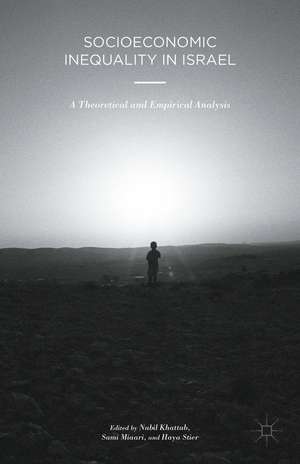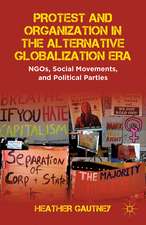Socioeconomic Inequality in Israel: A Theoretical and Empirical Analysis
Editat de Nabil Khattab, Sami Miaari, Haya Stieren Limba Engleză Hardback – 5 ian 2016
Preț: 391.22 lei
Nou
Puncte Express: 587
Preț estimativ în valută:
74.86€ • 78.58$ • 62.13£
74.86€ • 78.58$ • 62.13£
Carte tipărită la comandă
Livrare economică 10-24 aprilie
Preluare comenzi: 021 569.72.76
Specificații
ISBN-13: 9781137557193
ISBN-10: 1137557192
Pagini: 276
Ilustrații: XIII, 276 p.
Dimensiuni: 140 x 216 x 18 mm
Greutate: 0.49 kg
Ediția:1st ed. 2016
Editura: Palgrave Macmillan US
Colecția Palgrave Macmillan
Locul publicării:New York, United States
ISBN-10: 1137557192
Pagini: 276
Ilustrații: XIII, 276 p.
Dimensiuni: 140 x 216 x 18 mm
Greutate: 0.49 kg
Ediția:1st ed. 2016
Editura: Palgrave Macmillan US
Colecția Palgrave Macmillan
Locul publicării:New York, United States
Cuprins
Contents
List of illustrations
Acknowledgements
Introduction; Nabil Khattab, Sami Miaari, and Haya Stier
PART I: GENERAL INEQUALITY
1. The Correlates of Household Debt in Late-Life; Noah Lewin-Epstein and Or Raviv
2. Household Inequality and the Contribution of Spousal Correlations; Pnina O. Plaut and Steven Plaut
3. Religious Schooling, Secular Schooling, and Household Income Inequality in Israel: An Application of Regression-Based Inequality Decompositions; Ayal Kimhi and Moran Sandel
PART II: INEQUALITY IN EDUCATION
4. First-Generation College Students in an Expanded and Diversified Higher Education System: The Case of Israel; Hanna Ayalon and Oded Mcdossi
5. Ethno/religious hierarchy in educational achievement and socioeconomic status in Israel: An historical perspective; Dov Friedlander, Barbara S. Okun and Calvin Goldscheider
6. Overeducation and Wage Penalties amongst Immigrants, Native Minorities and Majority Ethnic groups; Nabil Khattab and Amit Lazarus
PART III: GENDER INEQUALITY
7. The 'Gender Revolution' in Israel: Progress and Stagnation; Hadas Mandel and Debora P. Birgier
8. Gender earnings gaps in ethnic and religious groups in Israel; Vered Kraus and Yuval Yonay
PART IV: ETHNIC INEQUALITY
9. Geographical considerations in Arabs' integration into the Israeli labour market; Izhak Schnell and Ilan Shdema
10. Horizontal inequality in Israel's welfare state: do Arabs receive fewer and lower cash benefits?; MichaelShalev and Amit Lazarus
Notes on contributors
Index
List of illustrations
Acknowledgements
Introduction; Nabil Khattab, Sami Miaari, and Haya Stier
PART I: GENERAL INEQUALITY
1. The Correlates of Household Debt in Late-Life; Noah Lewin-Epstein and Or Raviv
2. Household Inequality and the Contribution of Spousal Correlations; Pnina O. Plaut and Steven Plaut
3. Religious Schooling, Secular Schooling, and Household Income Inequality in Israel: An Application of Regression-Based Inequality Decompositions; Ayal Kimhi and Moran Sandel
PART II: INEQUALITY IN EDUCATION
4. First-Generation College Students in an Expanded and Diversified Higher Education System: The Case of Israel; Hanna Ayalon and Oded Mcdossi
5. Ethno/religious hierarchy in educational achievement and socioeconomic status in Israel: An historical perspective; Dov Friedlander, Barbara S. Okun and Calvin Goldscheider
6. Overeducation and Wage Penalties amongst Immigrants, Native Minorities and Majority Ethnic groups; Nabil Khattab and Amit Lazarus
PART III: GENDER INEQUALITY
7. The 'Gender Revolution' in Israel: Progress and Stagnation; Hadas Mandel and Debora P. Birgier
8. Gender earnings gaps in ethnic and religious groups in Israel; Vered Kraus and Yuval Yonay
PART IV: ETHNIC INEQUALITY
9. Geographical considerations in Arabs' integration into the Israeli labour market; Izhak Schnell and Ilan Shdema
10. Horizontal inequality in Israel's welfare state: do Arabs receive fewer and lower cash benefits?; MichaelShalev and Amit Lazarus
Notes on contributors
Index
Recenzii
"This edited volume provides an interesting and novel depiction of current socioeconomic inequality features, mechanisms and dynamics in Israeli society. The editors have very carefully and adequately tailored the various chapters to cover some of the most pressing issues in Israeli society as well as emerging issues in the study of socioeconomic inequality, more generally." - Meir Yaish, Chair of the Department of Sociology and Anthropology, University of Haifa, Israel
Notă biografică
Nabil Khattab is Senior Lecturer in Sociology at the Hebrew University of Jerusalem, Israel, and Honorary Research Fellow at the University of Bristol, UK. His latest publications include the co-edited volume Palestinians in the Israeli Labor Market: A Multi-disciplinary Approach and numerous articles in peer-reviewed journals such as Sociology, The Social Science Journal, and the British Educational Research Journal.
Sami Miaari is Lecturer at the Department of Labor Studies, Tel-Aviv University, Israel, and Research Fellow at the Israeli Democracy Institute. His research focuses on labor economics, economic causes, and consequences of conflict, including the economic costs of political instability and the relationship between economic shocks and conflict. His work on these issues has appeared in mainstream journals of economics such as the Journal of Public Economics, Journal of Population Economics, and Journal of Conflict Resolution.
Haya Stier is Professor of Sociology and Labor Studies at Tel-Aviv University, Israel. She has served as Chair of the Labor Studies Department, President of the Research Committee on Social Stratification, and the editor of Israeli Sociology. Her works on work-family issuesand inequality have appeared in leading sociological journals.
Sami Miaari is Lecturer at the Department of Labor Studies, Tel-Aviv University, Israel, and Research Fellow at the Israeli Democracy Institute. His research focuses on labor economics, economic causes, and consequences of conflict, including the economic costs of political instability and the relationship between economic shocks and conflict. His work on these issues has appeared in mainstream journals of economics such as the Journal of Public Economics, Journal of Population Economics, and Journal of Conflict Resolution.
Haya Stier is Professor of Sociology and Labor Studies at Tel-Aviv University, Israel. She has served as Chair of the Labor Studies Department, President of the Research Committee on Social Stratification, and the editor of Israeli Sociology. Her works on work-family issuesand inequality have appeared in leading sociological journals.
Textul de pe ultima copertă
This book uses different methodologies to explore inequality in a number of areas of Israeli society, focusing on Israel's diverse populations and communities. Israel is an interesting case among industrialized countries as the level of inequality is high across a number of measures. The country is extremely divided along ethnic, national, religious, and political lines, producing unique conditions within which the effects of factors such as gender, class, region, age, and education are highly contextualized. Income inequality in Israel is among the highest in the Western world; the poverty rate and income gap between classes are similarly high. The chapters in this volume address different aspects and areas of such inequalities in Israel. Conclusions drawn here expand our knowledge and understanding of the various mechanisms through which inequality is produced and maintained in Israel as well as the role that state policies play in minimizing or increasing the impact of these mechanisms.














